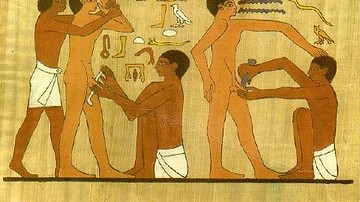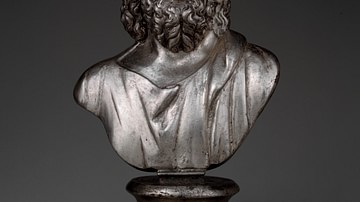Search
Search Results

Definition
Egyptian Medicine
Medical practice in ancient Egypt was so advanced that many of their observations, policies, and commonplace procedures would not be surpassed in the west for centuries after the fall of Rome and their practices would inform both Greek and...

Definition
Hyksos
The Hyksos were a Semitic people who gained a foothold in Egypt c. 1782 BCE at the city of Avaris in Lower Egypt, thus initiating the era known in Egyptian history as the Second Intermediate Period (c. 1782 - c. 1570 BCE). Their name, Heqau-khasut...

Definition
Third Intermediate Period of Egypt
The Third Intermediate Period (c. 1069-525 BCE) is the era following the New Kingdom of Egypt (c. 1570-c.1069 BCE) and preceding the Late Period (c.525-332 BCE). Egyptian history was divided into eras of 'kingdoms' and 'intermediate periods'...

Article
Gods and Heroes Archaeology Kit Review
If you are reading this, you probably love history and archaeology. And if you have children, then you have probably struggled at times to excite them about ancient ruins and archaeology. Here is an idea: let them be an archaeologist and...

Article
Color in Ancient Egypt
The ancient Egyptians had a great appreciation for life which is clearly depicted through their art. Images of people enjoying themselves - whether in this life or the next - are as plentiful as those most often seen of the gods or funerary...

Definition
Ptolemaic Dynasty
The Ptolemaic dynasty was a Macedonian royal family that ruled Ptolemaic Egypt from 323 to 30 BCE. It was founded by Ptolemy I, a general and successor of Alexander the Great. They built Alexandria, including the Lighthouse of Alexandria...

Article
Cultural & Theological Background of Mummification in Egypt
Many myths and falsehoods concerning the Egyptian practice of mummification have been promoted to the general public in movies, television shows, and documentaries. While these offerings are entertaining and fascinating to watch, the purposes...

Collection
The 12 Olympian Gods
The 12 gods of Mount Olympus were the most important deities in ancient Greece. In this collection, we examine each of the 12 in detail. With their all-too-human qualities in Greek mythology, the Olympian gods were capable of displaying great...

Definition
Serapis
Serapis is a Graeco-Egyptian god of the Ptolemaic Period (323-30 BCE) of Egypt developed by the monarch Ptolemy I Soter (r. 305-282 BCE) as part of his vision to unite his Egyptian and Greek subjects. Serapis’ cult later spread throughout...

Definition
Horus
Horus is the name of a sky god in ancient Egyptian mythology which designates primarily two deities: Horus the Elder (or Horus the Great), the last born of the first five original gods, and Horus the Younger, the son of Osiris and Isis...